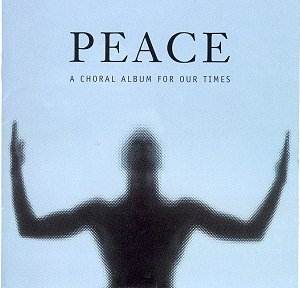Recently I reviewed
an outstanding CD of Christmas music by
this same Boston-based choir. .
Now a slightly earlier disc has come my
way and itís just as fine.
Iím not quite sure
of the target market for this disc.
Is it the established collector, who
may well have other versions of most
or all of the pieces offered here? Or
is it aimed at the general buyer who
may be attracted by the concept of "peaceful"
music? I ask the question for two reasons.
Firstly, if the disc is aimed at impulse
purchasers then the complexities of
Schoenbergís Friede auf Erden may
come as something of a shock. More seriously,
however, why put out a disc like this
without a single word about the music
itself in the booklet? The purchaser
who doesnít know about some or all of
the pieces may be all at sea. Some collectors,
like me, will have at least some of
the pieces on other CDs but why should
one have the inconvenience of looking
elsewhere if, say, one wants to find
out something about the aforementioned
piece by Schoenberg? I think itís quite
important to tell listeners the date
of composition of a piece, for example,
or that the Rachmaninov item is not
a free-standing work but a movement,
the third, from a larger work, his All
Night Vigil (or Vespers),
Op. 37. These things matter and Iím
afraid Avie get a black mark for this
omission. And while Iím finding fault,
it does seem a bit perverse to provide
biographical notes about the artists
and a history of the choir in French
and German as well as in English but
then only to give an English translation
of the sung texts.
Thankfully, thatís
all there is to complain about. The
music is, with one notable exception,
first rate, provided one doesnít object
to a diet of strictly slow music, and
the performances are in the same first
rate league.
Victoriaís wondrously
pure polyphony is beautifully sung,
the choir displaying exemplary control
and clarity. Randall Thompsonís lovely
Alleluia is also done very well,
the performance rising to an ecstatic
climax. Has anyone else composed such
a memorable choral work setting just
one word, I wonder?
The other two American
works fare equally well. Personally,
I prefer Barberís piece either in its
original string quartet form or in the
first arrangement that he made, for
string orchestra. Human voices canít
achieve, even at their best, the same
saturation of texture that strings can
provide and at times the tessitura is
cruel, especially for the sopranos.
However, the Handel and Haydn Society
Chorus cope splendidly, as youíd expect
from a group of professional singers.
Their account of Lauridsenís O magnum
Mysterium is one of the more spacious
that Iíve heard - Grant Llewellyn does
seem to have a predilection for expansive
speeds in slow music Ė but itís sustained
superbly. This rapt piece expresses
marvellously the wonder of the Incarnation
and itís very pleasing to hear it as
well done as it is here.
The fearsome difficulties
of Schoenbergís Friede auf Erden
present a huge challenge to any
choir essaying it. These singers seem
to take it all in their stride and they
give a lucid and committed account of
it. They are also successful in the
Górecki item. Arguably this piece
is over long but it here receives the
disciplined control of tone and dynamics
that are essential for a successful
performance. The same comments apply
to equally satisfying accounts of the
music by Rachmaninov and Tavener.
The disc closes with
two English items. The wordless chorus
by Delius seems a bit incongruous here
since it is the only secular piece on
the disc. No reservations about the
performance, however. I wish I could
be as enthusiastic, or indeed enthusiastic
at all, about the final item, a choral
arrangement by someone called John Cameron
(no details in the booklet) of ĎNimrodí
from Elgarís ĎEnigmaí Variations.
Iím sorry, but this just wonít do at
all. In the first place, as my colleague,
Gwyn Parry-Jones, very rightly pointed
out, the words donít fit properly. But
I think it goes deeper than that. Mr.
Cameron has taken it upon himself to
bring together Elgarís sublime music
and the words ĎLux Aeterna luceat eisí
from the Mass for the Dead. He may think
Elgarís music fits these words (it doesnít)
or suits them but in the latter case
heís quite wrong. ĎNimrodí has come
to be taken by many people as an elegy,
connected with mourning but itís nothing
of the sort. Elgar conceived it as a
tribute to his great friend, Jaeger,
but Jaeger was very much alive at the
time and his sudden and premature death
didnít occur for another decade! So
this arrangement is completely wrong-headed
and Iím afraid I think it makes a very
unsatisfactory end to what is otherwise
an excellent and dignified recital.
I mustnít end on a
sour note, however, for this is in every
other respect a first class programme,
splendidly executed and presented in
fine, clear sound. I enjoyed the disc
very much indeed. Itís highly recommendable
and will, I think, give much pleasure.
Taken with the other disc, mentioned
above, this CD confirms the very high
standard of the Handel and Haydn Society
Chorus under Grant Llewellyn. All I
can say is Lucky Boston!
John Quinn
See also review
by Gwyn Parry-Jones


